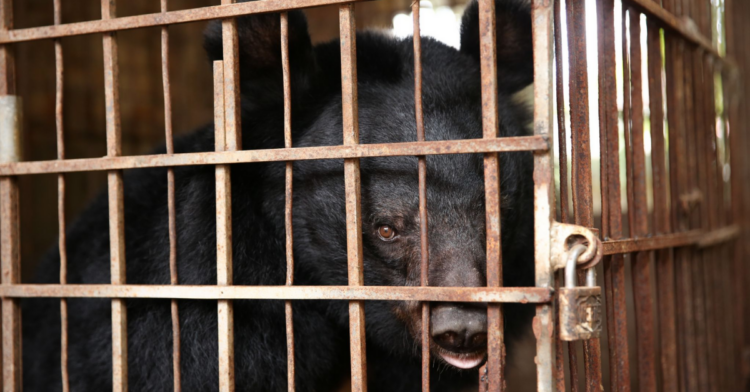For animal lovers, it’s hard not to feel a little conflicted when we hear stories of animals being rescued from horrific situations.
On one hand, hearing about what rescue dogs and cats have had to go through is disheartening. But seeing how much they thrive and and how much happier they clearly are after that rescue takes place is too uplifting to shy away from the rest of the story.
And while we tend to picture rescued animals in terms of the common pets we see stateside, there are important rescue efforts going on in many other parts of the world. Because the unfortunate truth is that majestic animals like elephants and gorillas are often not treated the way they deserve.
We can see that in the way that one bear in Vietnam has spent the last 20 years of her life, but her story also shows how much of a difference people can make when they persevere against a longstanding issue.
In Vietnam, there’s a practice called bile farming that has a long history of keeping bears caged to extract their bile.

According to People , this bile is an ingredient in traditional medicines and both the common living conditions for bile farming bears and the method for drawing it are extremely unhealthy for them.
As Liz Cabrera Holtz from a non-profit called World Animal Protection said about a bear named Tu Do, “She likely had her bile extracted at some point, an extremely painful process where bile is extracted from the gallbladders of living bears.”
And while the Vietnamese government banned this practice in 2005, a loophole that allowed bile farmers to keep their pets has kept it going illegally.
And it’s for this reason that Tu Do has spent the last 20 years in cramped cage.

According to Barbara van Genne at the Four Paws animal sanctuary, Tu Do’s living conditions have left her with with gallstones, liver issues and dental disease. She was also regularly fed dog and pig food while kept in this cage.
But while hundreds of bears still live in conditions like these throughout the nation, the past 15 years have also seen organizations like World Animal Protection and Education for Nature Vietnam work with the government to register and monitor all bears living on farms.
This prevents new bears from entering captivity to supplement the bile industry.
As for the bears who were grandfathered in like Tu Do, animal welfare workers have been trying to convince remaining farmers to surrender them to sanctuaries.

In Tu Do’s case, she was only able to finally leave her cage thanks to the perseverance of Phuong Le Duy, who encouraged her owner to let her go to a sanctuary every time he visited to inspect her.
And while that farmer kept silent during Phuong’s last visit, it became clear that his words had an impact when this person called a local ranger the next day to authorize her transition into the care of Four Paws.
This not only means she’ll finally be able to experience a better life, but that Vietnam’s Son La province no longer has any registered bears in this kind of captivity for the first time in over 20 years.

Now she will have access to acres of land that resemble her natural habitat and receive regular veterinary care for her various health issues as she’s rehabilitated.
Although it’s unclear how well she’ll be able to socialize with other bears at this time, van Genne said the rescue went well and that she was calm, friendly, and curious when she arrived.
In her words, “Tu Do will now live the life she deserves.”
h/t: People

















































